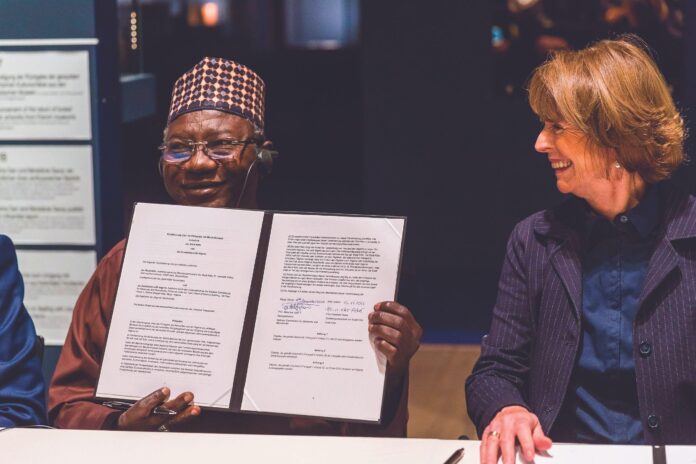“We are here to right a wrong,” German foreign minister Annalena Baerbock told an audience in Abuja, Nigeria, in December, on a visit to return 20 Benin bronzes from German museums that were looted by British troops in 1897. “What we are returning is a part of your history, a part of who you are.”
Months later, doubts are beginning to surface in the media. “World heritage in danger,” warned the Frankfurter Allgemeine Zeitung in late February, over an article by a retired ethnology professor, Brigitta Hauser-Schäublin, suggesting the sculptures would be at risk of theft in Nigeria. “It’s unclear whether the Nigerian people will benefit from the returns,” wrote Die Welt on 14 March, questioning whether the artefacts would be put on show. “Back to Benin” headlined the weekly Die Zeit: “And then what?”
Capacity
Abba Tijani, the director general of the Nigerian National Commission for Museums and Monuments (NCMM), has heard these doubts before. “Do we have the facilities? Do we have the capacities? These questions come up all the time,” he says. “There is no way I would commit to taking artefacts if I could not take care of them, or if we didn’t have qualified staff. Only a small number have been repatriated. I want to make sure we have the capacity to take care of them.”
The German government, states and museums last year transferred ownership of 1,117 Benin bronzes from five German museum collections to Nigeria, where the NCMM is responsible for them. The 22 bronzes so far returned (two at a ceremony in Berlin in July, 20 more in December) are the advance guard: hundreds more are expected to go back this year. The five museum collections with the largest holdings—in Berlin, Dresden, Stuttgart, Cologne and Hamburg—will keep around a third of the objects as long-term loans.
The prospect of hundreds of looted treasures returning to Nigeria has given impetus to an array of museum construction plans. “It has shone a light on the need for better museum infrastructure in Nigeria,” says Phillip Ihenacho, the executive chairman of the EMOWAA Trust. Two storage facilities are planned in Benin City. The Nigerian government has approved funding for a new depot that can house 3,000 bronzes, Tijani says, adding that it will have state-of-the-art security including surveillance. Separately, the EMOWAA Trust is building a facility sponsored by the Edo state and partially funded by the German government; whether returning bronzes will be kept there is unclear.
The EMOWAA Trust is raising money to build the Edo Museum of West African Art, designed by David Adjaye. The idea, Ihenacho says, “is not to be merely a receptacle for Benin bronzes; we are looking much more broadly.”
Upgrade programme
Meanwhile, the NCMM plans to upgrade its existing museum to become the Benin Royal Museum, the main showcase for the looted treasures. And the outgoing Nigerian president, Muhammadu Buhari, has announced plans for a National Museum of Unity in Abuja.
Barbara Plankensteiner, the director of the MARKK museum of world cultures in Hamburg, is sanguine about the belated backlash in the German press. The argument that looted African artefacts are safer in Western museums than in their countries of origin “dates from the 1970s or 1980s”, she says.
MARKK’s 2021 Looted History exhibition highlighted the bronzes in its collection. “What we mainly heard from visitors was that now they understood the background much better, they thought returning the bronzes was the right thing to do,” she says. “There were almost no voices of dissent.”

























